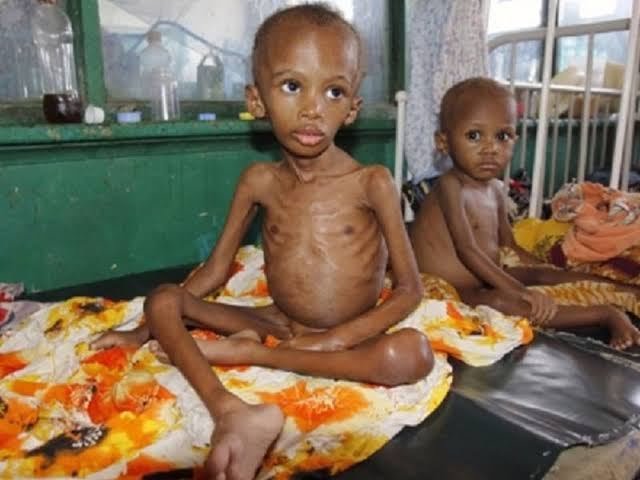Health
Tackling malnutrition via food demonstration for nursing mothers
Published
3 years agoon
By
Olu Emmanuel
Malnutrition is an issue no country can afford to overlook. Nutritionists describe it as an abnormal physiological condition caused by inadequate, unbalanced, or excessive consumption of macronutrients, micronutrients, or both.
UNICEF in 2019 released a document that showed that malnutrition was a direct or underlying cause for 45 per cent of all deaths of under-five children in the world.
The studies put Nigeria’s prevalence rate of stunted growth at 32 per cent of children under the age of five.
The report further showed that two million Nigerian children suffer from severe acute malnutrition (SAM), while two out of every 10 malnourished children receive treatment.
Similarly, seven per cent of women of childbearing age, according to the UNICEF report, suffer from acute malnutrition in Nigeria.
Nutritionists listed the four broad sub-forms of malnutrition as: wasting, stunting, underweight, and deficiencies in vitamins and minerals, and these conditions make children, in particular, more vulnerable to disease and death.
To check the high rate of malnutrition, some public hospitals in Kwara have devised means to help in the fight against high incidences of malnutrition in the state.
Civil Service Hospital, Ilorin, is one of the hospitals that adopted food demonstration for nursing mothers as a way to check cases of malnourished children.
The hospital teaches mothers how to improvise with locally available ingredients to form balanced diets for their infants.
Mrs Margret Olayinka, a Community Health Officer and Head of Department, Immunisation Unit of the hospital, a section that spearheads the food demonstrating activities for nursing mothers, explained why the programme was introduced.
Olayinka said that the programme was introduced following the discovery of cases of malnourished children among infants who came for immunisation some years back.
“There is something we call growth monitoring that we carry out for a child from birth until he or she is fully immunised.
“From growth monitoring like checking weight and arm circumference, we discovered children that are underweight for their age.
“When we interviewed their mothers, especially of children of six months and above, on what they feed their children with, some would say breast milk, while others could not give satisfactory answers.
“From this, we decided to introduce what we called fortified pap to them.
“Fortified pap is a semi-solid food they can give to the children once they reach the age of six months in order to guide against malnutrition,” she said.
Olayinka said that the effort had been very fruitful as no case of malnourished child was reported since the introduction of the demonstration.
“This is because what we taught them to be doing amounted to balanced diet. All the nutrients that a child needs are found in the foods we asked them to prepare.
“Besides, the fortified pap we always talked about is cheap and economical, even for the mother and the family at large to consume.
“It is made from guinea corn, soya beans, crayfish, and fish. Even fish and crayfish may not be really necessary for whoever that does not like their aroma.
“The most important ingredient is soya beans because it is highly proteinous. So adding it to the pap makes it more nutritious for babies. It helps them to develop well,” said Olayinka.
She also said mothers were trained on how to introduce and make family foods like beans, amala, semo, ewedu and moi moi for babies in different ways from that of adults.
“We teach them how they can peel the back cover of beans, cook and make it very soft and give to the children.
“We teach them how to make moi moi for children; how to prepare solid foods like amala, semo as well as how to make ewedu with crayfish or mashed fish.
“All these ingredients will make babies derive the necessary nutrients they need. “We also teach them how to match fruits together like doing smoothies for babies for vitamin acquisition.”
Mrs Bola Mohammed, a nursing mother resident in Ilorin, spoke on the effectiveness of the teaching.
“We were taught ways to prepare supplements with natural and locally available ingredients if we do not want to use those package baby foods.
“My little girl was malnourished and suffered weight loss. When I brought her here, I was asked to buy ingredients like guinea corn or millet, soya beans and add groundnut or dry fish if I like and grind them to make fortified pap.
“As soon as I fed her with it, I began to see changes. This food is cost effective because in our household we consume pap,’’ she said.
Mrs Abisola Olayemi, an Ilorin resident who also benefitted from the training, said that the fortified pap and tom-brown she learnt how to prepare during the food demonstration were effective in nourishing her children and improving their growth.
Olayemi, who demonstrated how fortified pap and tom-brown were made, stressed the need to carry out the preparation under a very hygienic environment to avoid contamination.
She said the foods were devoid of preservatives that could be harmful to children.
Olayinka, the sectional head of the unit, identified lack of money as the major challenge that always threatened the continuation of food demonstration.
“As we all know, money is the alpha to everything. We buy all the ingredients we use – guinea corn, soya beans, crayfish and fish among others, even the cooking gas.
“Our major challenge is financing the demonstration from time to time.
“With inflation, price of everything has soared.
“Nobody is giving the money, we leverage relationships to finance the food demonstration,” she said.
She, however, assured that the unit would continue to improvise to ensure that the programme does not stop.
She explained that immunisation is free, hence it would be difficult to levy nursing mothers, but said that the unit would source for resources to sustain the programme.
Another challenge for the programme is the Covid-19 pandemic.
Olayinka said the outbreak of the pandemic changed the routine at the hospital.
“Covid-19 stopped us from meeting people in groups. We used to carry out the demonstration in groups of 20 mothers; it was a kind of group discussion.
“But Covid-19 has forced us to stop this gathering. We do attend to our patients now one after the other. We don’t even want them to wait. At a point, we stopped the demonstration.
“As a result of this development, some mothers have not been able to witness the demonstration or benefit from this training,” she added.
In her reaction to the efforts of public hospitals in Kwara to improve nutrition, Mrs Chinwe Ezeife, Nutrition Specialist at Kaduna Field Office of UNICEF, commended the health workers for their commitment in the fight against malnutrition.
“I am happy that they are integrating nutrition services as part of their routine. “The food demonstration services will give practical skills to pregnant and nursing women on how to prepare complementary foods, which they have to introduce to children of six months and above.
“The counselling on maternal nutrition will build their skills and enhance their capabilities for optimal infants and young child feeding practices,” she said.
Ezeife called on policy makers in Nigeria to see nutrition as a human capital development.
According to her, policy makers must know that nutrition is not just a health intervention, but a human capital development that requires head-on attention.
“In fact, this is in line with the SDGs of which nutrition is very important,” she said.
Trending

 Business2 days ago
Business2 days agoOn The Central Bank Of Nigeria’s Circular Relating To The Collection And Remittance Of The National Cybersecurity Levy

 News1 week ago
News1 week agoOrganisers announce date for inaugural Yoruba World Heritage Cultural Festival in Canada

 Politics2 days ago
Politics2 days agoReactions as Tinubu appoints Emeka Woke, CEO, Ogun-Osun River Basin Dev Authority, after resignation from Fubara’s cabinet in Rivers

 Latest6 days ago
Latest6 days agoWike Vs Gov Fubara: Again Rivers State and The ‘Familiar Spirit’ Tussle

 Business6 days ago
Business6 days agoTransition Train, partners Patrick Ogunjobi & Co, forges path to financial freedom for Nigerians

 Business2 days ago
Business2 days agoNCDMB co-chair, Ekpo meets Exec Sec, pledges support for local content programmes

 Featured2 days ago
Featured2 days agoTinubu confers national honour on Awujale of Ijebu

 Latest1 day ago
Latest1 day agoOne shot as detained soldiers break out of ‘overcrowded cells’ to protest poor feeding




